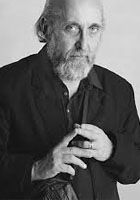Jerome Rothenberg
Jerome Rothenberg Poems
I like to cross
these borders. They take place
between the dead & dead.
I make my mind up
...
I was amok & fearless
twice deceived
for which I sought out
satisfactions
...
the bridges of Chicago
are not the bridges of Paris
or the bridges of Amsterdam
...
I am the Giant Goliath,
I digest goat cheese.
I am a mammoth's calf.
...
The cruel majority emerges!
Hail to the cruel majority!
They will punish the poor for being poor.
They will punish the dead for having died.
...
My name is smaller
than it sounds.
I work & polish it
until a light
...
3:00 P.M.
The green man, more a man
than most, took a scissors,
cut the sky with it,
...
the zig zag mothers of the gods
of science the lunatic fixed stars
& pharmacies
fathers who left the tents of anarchism
...
Beginning with olive trees.
Shadows.
Beginning with roosters.
Crystal.
Beginning with castanets & almonds.
...
a trembling old man dreams of a chinese garden
a comical old man dreams of newspapers under his rabbi's hat
a simple tavernkeeper dreams of icicles & fisheyes
...
Despair leaves
a dry spot
the passage of light
through my veins.
I fail as a celibate.
...
He takes a book down from his shelf & scribbles across a
page of text: I am the final one. This means the world will
end when he does.
...
Jerome Rothenberg Biography
Born on December 11, 1931 to Morris and Estelle Rothenberg, Jerome Rothenberg was raised in New York City and graduated from the City College of New York in 1952 with a BA in English. He went on to the University of Michigan to receive his Masters in Literature in 1953. From 1953 until 1955, he served in the U.S. Army in Mainz, Germany and afterwards returned to New York and continued his graduate studies at Columbia University until 1959. Rothenberg began his literary career in the late 1950s working primarily as a translator; he is responsible for the first English appearances of Paul Celan and Günter Grass. He founded the Hawk’s Well Press in 1959, and with it, the magazine Poems From the Floating World. Hawk’s Well Press published Rothenberg’s first book, White Sun, Black Sun, in 1960. He remained in New York City teaching, writing, and publishing until 1972, when he moved to the Allegany Seneca Reservation. In 1974, he moved to California to teach at the University of California, San Diego. Rothenberg has published over seventy books and pamphlets of poetry. His books have been translated into multiple languages; two of them have been turned into stage plays and performed in several states. He has also assembled, edited and annotated over ten anthologies of experimental and traditional poetry and performance art and has been the editor or co-editor of several magazines. He has translated an enormous amount of world literature, including Pablo Picasso and Vítezslav Nezval. He has been deeply involved in performance art and has written several plays. Throughout his literary career, Rothenberg has explored or been influenced by global cultural movements, including the Dadaists, North American Indian culture, Japanese literature, his familial connections with the Jewish communities of Eastern Europe, and a vast range of tribal poetics, both verbal and non-verbal. At the beginning of his career he and fellow poet, Robert Kelly, began the Deep Image movement, coining the term and citing the Spanish ‘cante jondo’ for ‘deep song’ and Federico García Lorca as their inspirations. Rothenberg is probably best known for his work in ethnopoetics, a term he coined, involving the synthesis of poetry, linguistics, anthropology, and ethnology. Through it he sought to both to perpetuate fading oral and written literary legacies of the world and render them relevant and necessary to modern literature. His 1968 anthology, Technicians of the Sacred, a collection of African, American, Asian and Oceanic poetics, went beyond mere folk songs and included the texts and scenarios for ritual events and both visual and sound poetry. This anthology has informed a generation of artists of the immense potentiality and value of poetry throughout the world. He also founded and co-edited the first magazine of ethnopoetics, Alcheringa, and has been referred to as the father of American ethnopoetics. His numerous awards and honors include grants from the Guggenheim Foundation and the National Endowment for the Arts; two PEN Oakland Josephine Miles Literary Awards; two PEN Center USA West Translation Awards; and the San Diego Public Library’s Local Author Lifetime Achievement Award. In 1997 he received a Doctorate of Letters from the State University of New York and was elected to the World Academy of Poetry in 2001. Rothenberg has taught at the City College of New York, the State University of New York, Binghamton, and spent the majority of his teaching career at the University of California, San Diego, where he remains an emeritus professor of visual arts and literature)
The Best Poem Of Jerome Rothenberg
I Will Not Save the World
I like to cross
these borders. They take place
between the dead & dead.
I make my mind up
to be honest
only I fail to meet
their expectations.
I will not save the world.
The power in my blood
runs through my shoe.
I have never known fatigue
but know it now. I whistle
& the dog sits still
& ponders.
Nobody else is resting
or in love.
The taste of death is in my mouth.
I suck it like an arm
until it breaks me.
It is the fate of animals
& birds
the small lives left behind.
The children in the woods
run by like children.
I hide under a blanket
sick with counting.
Two & two are five
but two times two
is always four.
Call me tomorrow
—says the voice—
& I will call you back.
I am a net for all
voracious fish (E. Södergran)
& long for hell.
